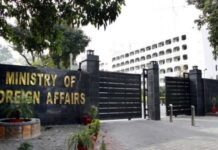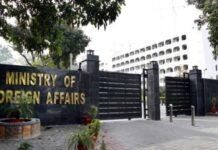ISLAMABAD: Rural to urban migration, conversion of farm land into industrial and housing zones and low level of investment in agriculture sector, especially in small-scale farming, are some of the causes of increasing risks of food insecurity and loss to rural development in the country, said speakers at a seminar on the World Food Day on Monday.
The event had been organised by the Sustainable Development Policy Institute (SDPI).
Speaking on the occasion, SDPI Executive Director Dr Abid Qayyum Suleri, was of the view that Pakistan was linked to the triangular theme of the World Food Day: Migration, Food Security and Rural Development. “The country is fast moving towards a services based economy from the industrial base economy. With more people gradually shifting from agriculture production to service sector, a gap at agriculture sector is being created, which results in the low calories consumption by a large number of people,” he said. He feared that the people in Gilgit Baltistan, Balochistan, FATA and some part in Sindh would face food insecurity.
The representative of Food and Agriculture Organization (FAO) in Pakistan, Mina Dowlatchahi, said that there was a need for appropriate policies and strategies to feed the growing population of cities which was possible only through a strong agriculture sector. “Though a lot of work is being done to improve the levels of nutrition and introduce innovation in agriculture sector, Pakistan’s proposed Food Security Policy, now in the phase of being finalized, needs to address some fundamental questions such as how much Pakistan needs to invest to support small holding farmers and women farmers in terms of provision of credit and input facilities to them. This will enable them to grow flood and climate resistant crops. There is also a need to invest in rural development in terms of providing children nutritious food, better schooling and clean drinking water,” he said.
MNA Romina Khursheed Alam said that respective governments acknowledged that agriculture was the backbone of the economy and the trend of rural to urban migration was also a matter of concern. “Migration affects agriculture production as rural population leaves agriculture farming and livestock rearing. It starts moving to cities at the cost of production of food. They increase the burden on the meager resources of cities. We can ensure food security of our people by giving priority to rural development and modernisation of agriculture so that the people get their livelihood and food at their door step and they do not need to migrate for livelihood or food,” she said.
Dr Muhamamd Azeem Khan, the National Agriculture Research Council (NARC) director general, said that on the policy front, the country had been focusing on the goal of achieving self-sufficiency in food and not the rural development. “Now we have to work on both for achieving the goal of food security and putting a halt to rural to urban migration,” he said.
He was of the view that despite low levels of research and development (R&D) funding, Pakistan had been able to produce a number of high yielding varieties of food, including rice and wheat. “There is a time now that we reallocate and provide more resources for rural development and innovative agriculture methods and techniques to achieve the goal of food security,” he said.
Published in Daily Times, October 17th 2017.















